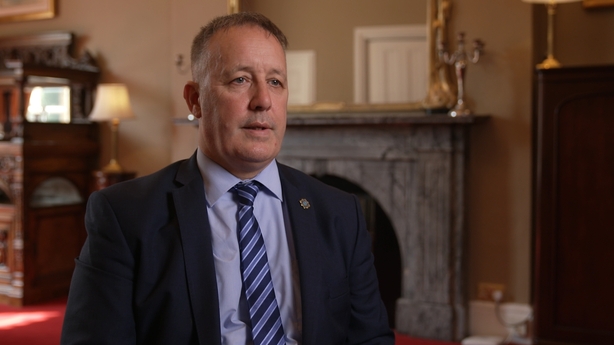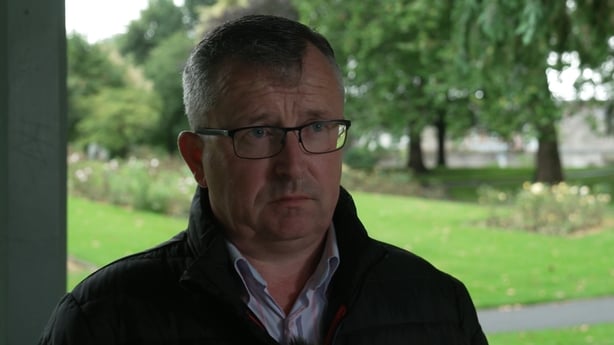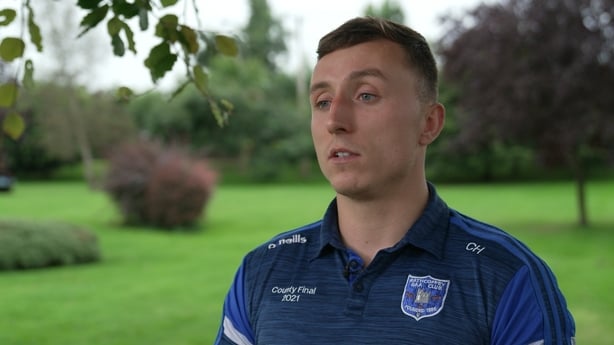Drug users and their families have been forced to sell property, farmland, and machinery to clear drug debts of tens of thousands of euro, according to Irish experts familiar with drug related intimidation.
Drug related intimidation occurs when a criminal or criminals allege that a sum of money is owed as a result of a drug debt. It can involve family members of the person in debt being subjected to intimidation or the threat of intimidation.
"It is a rural phenomenon. It is an urban phenomenon." says Detective Superintendent Sé McCormack of the Garda National Drugs and Organised Crime Bureau said.
"We have heard stories of people being intimidated and forced to sell property, to sell equipment, to sell machinery, to move house, all of these things in all of the different areas of the country."
People working at the coalface of addiction in Ireland told Prime Time that it is not uncommon to pay €50,000 to clear off a drug debt and make a drug dealer go away.
More than 1,500 formal complaints about drug-related intimidation have been made since 2021, figures provided by An Garda Síochána show.
Just over a third of those complaints were made last year, when a record number of people were treated for problem drug use in Ireland, according to the Health Research Board (HRB).
The data was gathered through the Drug Related Intimidation Programme, a process which sees specially-trained Garda inspectors and family support workers speak confidentially with people affected.
It shows that the primary complaint linked to such intimidation was criminal damage, with over 550 incidents.
Other related complaints include blackmail and extortion, threats to kill or threats to cause harm, demanding payment with menace, arson, and assaults causing harm according to Detective Superintendent McCormack, who works in the Garda National Drugs and Organised Crime Bureau.
WATCH: Family forced to flee over son's drug debts
Det Supt McCormack says the intimidation can start with a silent phone call, followed by a simple phone call or text message saying that someone in your family owes a debt.
This can be followed up with a knock at the door from a drug dealer seeking repayment, warning that if a debt is not paid there will be consequences. When escalated, it can lead to damage to windows and doors; damage to cars - such as brake fluid being poured on to destroy the paintwork - and tyres being slashed.

Cocaine addiction
Increased cocaine use and dependence across the country is a major factor in cases of drug related intimidation, according to addiction counsellor Michael Guerin.
"Drug debts are particularly an issue with cocaine abuse, because people's tolerance of cocaine goes up quite quickly, and they can burn through quite a lot of money using cocaine," Mr Guerin told Prime Time.
Cocaine use in Ireland is often associated with the prosperous Celtic Tiger years when its use was at its highest, but the Limerick-based counsellor says this current period is likely surpassing that era.
"The latest iteration of cocaine we are witnessing will probably be recorded in history as the time where all of societal and economic demographics that we held to be true within the drug treatment sector were obliterated. It’s everywhere. It’s in every town, city, village and rural area of the country," Mr Guerin said.
Personal consequences
'Jack’ – not his real name – is a man with a history of addiction who spoke to Prime Time on the condition of anonymity.
He started taking drugs "as a form of escapism" when he was a teenager, he said. His drug use quickly escalated from recreational drug use to addiction.
"I eventually ended up taking a lot of cocaine, a lot of crack, and a lot of tablets – benzos [benzodiazepines]."
"Debts were a major part of my life for decades," Jack explained.
"I would have had on-going small drug debts that I would have been paying off. At times I would have had large drug debts – from €5,000 to €10,000 to €20,000 to €30,000."
Jack says that many threats have been made to both his and his families’ lives.
"I didn’t feel there was a way out. I was suicidal. It actually led me to take more drugs. It let me to overdoses. In many ways you are living a life where you just don’t see a way out," he said.
When he did not have money to pay drug dealers back, they came looking for it from members of his family.
"There’s a whole plethora of people who are dealing with the stress and the worry that’s associated with the debt you’ve racked up."
When he was in the grip of addiction, Jack used to also deal drugs. So, he has an intricate understanding of the eco-system that makes up the criminal drugs underworld.
"Drugs are illegal and it's unregulated. So, if someone owes you €5,000 or €10,000, you can't go to the police or you can't go to court. You have to get it yourself. People have to take it upon themselves to go and get the money - that could be anything from threatening to burn your house down, threatening to kill your family members or threatening to kill you," Jack said.
This is the backdrop to a lot of drug users turning to selling drugs, but it often has disastrous consequences.
"The country is awash with drugs. It's easy to get drugs on credit. It's easy to get large amounts of drugs to sell," Jack said. "That's where a lot of problems start for a lot of people, because contrary to popular belief, it's not as easy to sell drugs as you might think.""You have to be clever. You have to get customers. You have to be able to get the money. You have to be able to not spend the money when you get it," Jack said.
He said that a lot of impressionable young people get drugs in the belief that they will sell them. But they end up using them or spending the money on €1,000 jackets and expensive trainers. Then they owe money to a drug dealer that they cannot repay.
If they cannot get money owed for drugs off young people, some drug dealers seek repayment by getting them to hold drugs or move drugs for them.
"The money that's being paid to deliver drugs and hold drugs isn't a lot. So, there's a huge amount of risk on the person," Jack said.
Addiction counsellor Michael Guerin is aware of a case where a man transported cocaine with an estimated street value of €10,000 a long distance across Ireland to repay a debt of €800 which he owed for cocaine.
"He put himself at risk of a very long jail sentence had he been apprehended. It's indicative of the risks people will take to get very small amounts of money written off the debt that they owe for cocaine," Mr Guerin said.

Reluctant to report
While the numbers of people reporting being subjected to drug related intimidation make for stark reading, Det Supt McCormack acknowledges that as not all incidents are reported, the full scale of the problem is unknown.
"We fully recognise that there is a large cohort of people who won't come to the Gardaí for whatever reason," Det Supt McCormack.
Addiction counsellor Michael Guerin said, "People are very reluctant to go to the Gardaí and report for fear of reprisal. And very often they don't have a lot to go to the Gardaí with anyway, because they will be contacted on multiple phone numbers, they will be contacted by different people, and there will be no real method of conclusively identifying the person who is carrying out the intimidation."
In order to overcome that problem, a project has been set up to encourage people to come forward when they have been threatened.
"The DRIVE Project was established to develop responses and increase capacity for responses to drug-related intimidation," Detective Supt McCormack said.
DRIVE (Drug Related Intimidation & Violence Engagement) is an inter-agency project involving bodies such as Drug and Alcohol Task Forces, the Gardaí, the HSE, and the Department of Justice. It aims to help communities to support victims of drug related intimidation and violence.
Before the end of the year, DRIVE will roll out a national awareness campaign to promote the services and supports available to people impacted by threats and intimidation.
In early 2025, DRIVE and the HRB will launch a data collection system to collate all incidents of drugs related intimidation reported to drug and alcohol services across the country. This will give a more accurate overall picture of the issue.
READ: Family forced to flee following threats and attacks
Growing problem
A record 13,104 cases were treated for problem drug use in Ireland last year, according to the HRB with children as young as 15 recorded as having taken cocaine.
Conor Harris was a gifted Gaelic footballer who played with Kildare underage teams, before his life descended into chaos after he started taking cocaine when he was 17.
He started taking €50 worth of cocaine on a night out and that soon increased to €200 worth. He started selling drugs to feed his addiction.
By the time he overdosed at the age of 18, he had racked up debts of €20,000. Like many people in that situation, he got a Credit Union load to try and pay off his debt.
"But I went back and did the same thing again. And by the time I came out of rehab, I had a €22,500 bill to pay," Conor Harris told Prime Time.
Conor said he was constantly looking over his shoulder when he owed drug money. At one point, he was put into the back of a car and told by drug dealers that he was going to be shot if he did not repay one of the drug debts he owed to several dealers.
Then his family, who have no involvement in drugs, got dragged into trouble.
He said, "When I wasn't showing up to pay my bills, they were going straight to my family, straight to my sister, straight to my mother, and demanding that money.
"I had to ring my mother and my six-year-old sister on Christmas Eve and tell them that they had to leave the house because there was people coming down to go through the house because I owed them money," Conor said.
For Conor, the threats were not empty and could have had catastrophic consequences.
"Someone I owed money to came down and put a brick through my window. And the fortunate thing was that my sister, who was six or seven at the time, had actually got up to go toilet while this had happened, and the brick landed on her bed.
"So, if this had happened five minutes earlier, that brick would have landed on my little sister."
Conor got treatment for his addiction and after he came out of rehab, he owed four or five drug dealers money. He started off paying two dealers at a time by working two jobs and paying them off in monthly instalments.
In recovery for five years, he now gives talks in schools and GAA clubs. He has not taken a drink or drug since he came out of treatment, and he is back playing football again.
He said, "I've got my football life back, I've got my gym life back, I'm captain of my club. I have a little sister who I love… I never ever had a proper relationship with my mother and I have that now. And most of all, I have myself back."

Former drug dealer Jack, who has also overcome his addiction, counts himself as one of the lucky ones after he had a dangerously close brush with death.
He was being taken away in a car one day by a group of armed drug dealers when he managed to escape from the car.
"I was at a really low point in my life. I was suicidal and I believed I didn't want to be here anymore. And I got chased up that road and I could hear the bullets going past me and hitting things around me. And I never forget. All I wanted to do in that moment was live. And I realised I did want to live. I just didn't want to live the life I was living."
He managed to get money to pay off his debts before going into treatment. He said, "I managed to navigate my way out. But if you'd have told me that at that time, I would have said, No, there's no way out of this."
If you have been affected by the issues raised in this story you can speak to someone by contacting one of the numbers at rte.ie/ie/helplines.
Reporter Conor McMorrow and producer Lucinda Glynn's report 'Drugs, Debts and Threats’ will be broadcast on the 12 September edition of Prime Time on RTÉ One and RTÉ Player.





